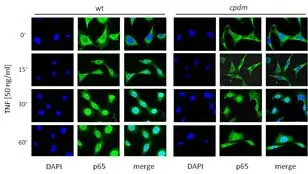The study – led by Cancer Research UK-funded scientists based at Imperial College London in collaboration with researchers from La Trobe University, the University of Melbourne, and the German Cancer Research Centre (DKFZ) – may also shed light on the causes of certain autoimmune diseases, such as rheumatoid arthritis and psoriasis.
TNF plays a pivotal role in protecting the body against infection by bacteria, viruses and other pathogens, and also cancer. It does this by directing the immune system to spot rogue pathogens and cancer cells, and then destroy them.
But at a certain point in the development of cancer TNF is transformed from a cancer killer to a cancer promoter. So instead of destroying cancer cells TNF encourages them to grow and spread by triggering inflammation in the surrounding tissues.
Short-term inflammation is used by the body to increase blood flow to an injury, helping it heal faster. But scientists believe prolonged inflammation may be exploited by some cancers to help fuel the growth and spread of the disease.
The researchers discovered how a protein called ‘Sharpin’ prevents TNF from inducing inflammation, providing new clues to how cancers may be able to ‘hijack’ the immune system.
Study leader Professor Henning Walczak, based at Imperial College London, said: “We discovered that the inflammatory skin problems triggered in mice lacking Sharpin could be completely resolved by switching off TNF. This was a striking result, not least because TNF-controlled inflammation is central to a wide variety of different diseases from autoimmune diseases - like rheumatoid arthritis and psoriasis - to cancer.
“Understanding how inflammation is controlled in the body on a molecular level could one day open the door to completely new approaches for treating both cancer and autoimmune disease."
Dr Lesley Walker, director of cancer information at Cancer Research UK, said: “This important discovery is the culmination of six years work and demonstrates how basic research into the fundamental mechanisms of inflammation may lead to exciting new insights into the role of inflammation in cancer. Although still at an early stage, we hope this will open up new avenues of research for developing treatments that target cancer-related inflammation in the future."
About DKFZ
With more than 3,000 employees, the German Cancer Research Center (Deutsches Krebsforschungszentrum, DKFZ) is Germany’s largest biomedical research institute. DKFZ scientists identify cancer risk factors, investigate how cancer progresses and develop new cancer prevention strategies. They are also developing new methods to diagnose tumors more precisely and treat cancer patients more successfully. The DKFZ's Cancer Information Service (KID) provides patients, interested citizens and experts with individual answers to questions relating to cancer.
To transfer promising approaches from cancer research to the clinic and thus improve the prognosis of cancer patients, the DKFZ cooperates with excellent research institutions and university hospitals throughout Germany:
- National Center for Tumor Diseases (NCT, 6 sites)
- German Cancer Consortium (DKTK, 8 sites)
- Hopp Children's Cancer Center (KiTZ) Heidelberg
- Helmholtz Institute for Translational Oncology (HI-TRON Mainz) - A Helmholtz Institute of the DKFZ
- DKFZ-Hector Cancer Institute at the University Medical Center Mannheim
- National Cancer Prevention Center (jointly with German Cancer Aid)
The DKFZ is 90 percent financed by the Federal Ministry of Education and Research and 10 percent by the state of Baden-Württemberg. The DKFZ is a member of the Helmholtz Association of German Research Centers.
